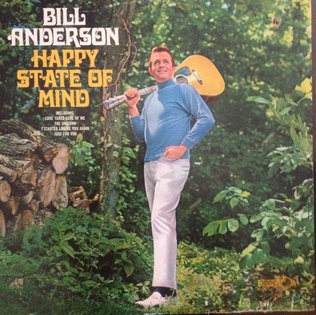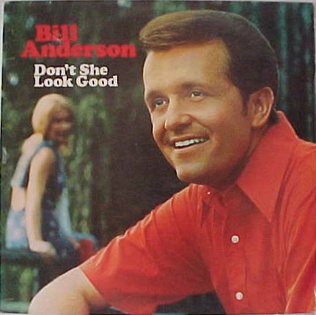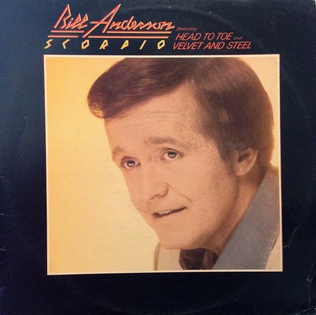Related Research Articles
"Quits" is a song written and recorded by American country singer-songwriter Bill Anderson. It was released as a single in 1971 via Decca Records and became a major hit the same year.

I Can Do Nothing Alone is a studio album by American country singer-songwriter Bill Anderson. It was released in June 1967 on Decca Records and was produced by Owen Bradley. It was Anderson's seventh studio record and his first album to consist entirely of gospel music. Although the album did not produce any singles, it made peak positions on the Billboard country albums chart.

Happy State of Mind is a studio album by American country singer-songwriter Bill Anderson. It was released in September 1968 on Decca Records and was produced by Owen Bradley. Anderson's tenth studio recording, it was also his second studio album released in 1968. Among the songs included on the release was the title track, which became a major hit in both the United States and Canada.

My Life/But You Know I Love You is a studio album by American country singer-songwriter Bill Anderson. It was released in June 1969 on Decca Records and was produced by Owen Bradley. It was Anderson's eleventh studio album to be issued during his musical career. The album's title was derived from its two singles of the same names. Both singles became major hits on the Billboard country chart.

Don't She Look Good is a studio album by American country singer-songwriter Bill Anderson. It was released in November 1972 on Decca Records and was produced by Owen Bradley. The album was Anderson's twentieth studio recording to be issued. It was also his fourth studio album released in 1972. Two additional projects were collaborations with Jan Howard earlier in the year. The album's only single was the title track, which became a major hit on the country charts.

Bill is a studio album by American country singer-songwriter Bill Anderson. It was released in July 1973 on MCA Records and was produced by Owen Bradley. It was Anderson's first studio album to be released on the MCA label after Decca Records merged with the label. It was also his twenty first studio recording to be released and only album project to be issued in 1973. The album included three singles, two of which became number one hits in either the United States and Canada. The album itself also would reach peak positions on national publication charts.

Every Time I Turn the Radio On/Talk to Me Ohio is a studio album by American country singer-songwriter Bill Anderson. It was released in January 1975 on MCA Records and was produced by Owen Bradley.

Scorpio is a studio album by American country singer-songwriter Bill Anderson. It was released in April 1977 on MCA Records and was produced by Buddy Killen. Scorpio was Anderson's 26th studio album as a recording artist and first album release of 1977. Another album would follow later in the year. The project produced two singles that became major hits.
"Love Is a Sometimes Thing" is a song written by Jan Howard. It was first recorded by American country singer-songwriter Bill Anderson. It was released as a single in 1970 via Decca Records and became a major hit the same year.
"Where Have All Our Heroes Gone" is a song written and first recorded by American country singer-songwriter Bill Anderson. It was also co-composed with Bob Talbert. It was released as a single in 1970 via Decca Records and became a major hit the same year.
"Always Remember" is a song written by Jerry Bradley and Patsy Lawley. It was first recorded by American country singer-songwriter Bill Anderson. It was released as a single in 1971 via Decca Records and became a major hit the same year.
"All the Lonely Women in the World" is a song written and recorded by American country singer-songwriter Bill Anderson. It was released as a single in 1972 via Decca Records and became a major hit the same year.
"Don't She Look Good" is a song written by Jerry Chesnut that was recorded by American country singer-songwriter Bill Anderson. It was released as a single in 1972 via Decca Records and became a major hit the same year.
"Can I Come to You" is a song written by Jerry Crutchfield and Buddy Killen. It was recorded by American country singer-songwriter Bill Anderson. It was released as a single in 1974 via MCA Records and became a major hit the same year.
"Every Time I Turn the Radio On" is a song written and recorded by American country singer-songwriter Bill Anderson. It was released as a single in 1974 via MCA Records and became a major hit the same year.
"I Still Feel the Same About You" is a song written and recorded by American country singer-songwriter Bill Anderson. It was released as a single in 1975 via MCA Records and became a major hit the same year.
"This Is a Love Song" is a song written by Jim Weatherly. It was first recorded by American country singer-songwriter Bill Anderson. It was released as a single in 1979 via MCA Records and became a major hit the same year.
"That's What Made Me Love You" is a song written by Lawrence Shoberg. It was first recorded as a duet by American country artists Bill Anderson and Mary Lou Turner. It was released as a single in 1976 via MCA Records and became a major hit the same year.
"Country D.J." is a song written and first recorded by American country singer-songwriter Bill Anderson. It was released as a single in 1975 via MCA Records and became top 40 hit single.

The singles discography of American country singer-songwriter Bill Anderson contains 84 singles, three promotional singles, 6 other charted songs and four music videos. After signing to Decca Records in 1958, Anderson released a series of early singles that became hits, reaching the top ten and 20. This included "That's What It's Like to Be Lonesome" (1958), "The Tip of My Fingers" (1960) and "Po' Folks" (1961). The following year, he reached number one on the Billboard Country and Western Sides chart with "Mama Sang a Song." In 1963, Anderson released his most commercially successful single, "Still." The song was his second number one country single and his first top ten hit on the Billboard Hot 100, climbing to number eight. His follow-up single, "8×10" reached similar crossover success. Anderson released 11 more top ten country hits during the rest of the decade. This included the number one singles "I Get the Fever" (1966) and "My Life " (1969). He also had a number one hit with Jan Howard called "For Loving You" in 1968. Anderson also had top ten hits with "I Love You Drops" (1965), "Happy State of Mind" (1968) and a cover of "But You Know I Love You" (1969).
References
- ↑ "Bill: Bill Anderson: Songs, Reviews, Credits". Allmusic . Retrieved 23 July 2020.
- 1 2 Anderson, Bill (July 1973). "Bill (Album Information and Liner Notes)". MCA Records .
- ↑ Whitburn, Joel (2008). Hot Country Songs 1944 to 2008. Record Research, Inc. ISBN 978-0-89820-177-2.
- ↑ ""if You Can Live with It" chart history". Billboard . Retrieved 23 July 2020.
- ↑ "Search results for "Bill Anderson" -- Country Singles". RPM . Retrieved 9 April 2020.
- ↑ "Bill Anderson -- "If You Can Live with It (I Can Live Without It)" (1973, Vinyl)". Discogs . Retrieved 23 July 2020.
- ↑ "Bill Anderson Chart History (Hot Country Songs)". Billboard. Retrieved July 23, 2020.